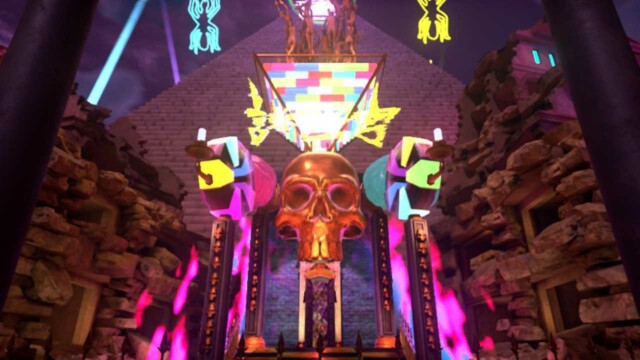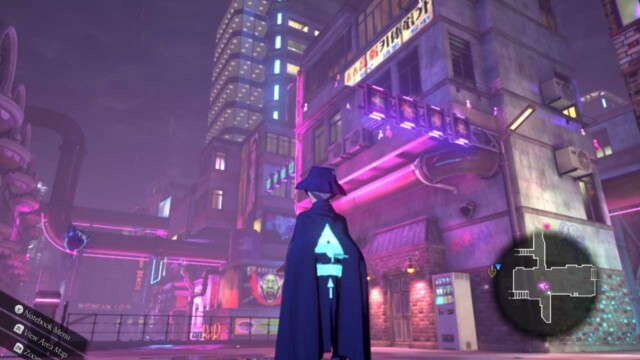DANGANRONPA is a much-beloved series by fans all over the world, but it had a problem.
Just as Danganronpa V3 made a rather conclusive finale, Spike Chunsoft made it clear that there would never be a fourth.
One of Rain Code’s strengths is the world-building.
 Yuma and Shinigami search for the truth together.
Yuma and Shinigami search for the truth together.
 The Mystery Labyrinth guides them to the truth.
The Mystery Labyrinth guides them to the truth.
It was bittersweet. Fans wanted more, but at the same time it’s good to see a series end before it is drawn out and dried up.
Team Danganronpa moved on to something new.
First, Zanki Zero took the heart of Danganronpa, like its excellent characters and cunning plot twists, and turned it into a dungeon crawler.
While these parts stayed true to the already well-developed fan base, the dungeon-crawling aspects didn’t play to the team’s strengths.
Enter Master Detective Archives: Rain Code, which is more closely aligned to, but still distinct from, the Danganronpa formula.
It again focuses on the characters, and the murders that our young detective protagonist must solve.
The difference here is that it is not 16 people locked together with no way of escape, but the hundreds of residents of Kanai Ward, a town where it’s always night and always raining.
Your job is to get to the heart of the mysterious weather, and why the ward was suddenly shut off from the rest of the world.
In order to do so, you must get into all of the dark corners of Kanai Ward and gain information via the people’s trust.
Instead of Class Trials, you take part in Mystery Labyrinths that ask you smaller questions about each murder plot while leading you to the overall answer.
The downside here is that once you find the culprit in each murder, your partner in crime will reap their soul, murdering them in the real world.
It poses the moral question as to whether this is the right thing to do.
You might prove the innocence of another suspect, but at the same time, you are acting as God.
The stakes are different to those in Danganronpa. If you don’t find the right murderer there you risk the lives of every other person you’re with.
Here you only risk leaving the mystery unsolved, making it a more difficult dilemma.
However, the in-game characters are all fictitious, and it’s your bond with them that determines whether their deaths have meaning.
But unlike Danganronpa, each murder is its own self-contained case, and there are only a few characters that you carry with you across the overarching plot.
This means that whether a character lives or dies is essentially meaningless, as you spend such little time with them before finding out that they do murders.
This makes the reaping of their souls less impactful, with a feeling that they deserve their fate.
Which brings us to our soul reaper, Shinigami, a death god that you have made a pact with.
You gain her powers to open the Mystery Labyrinths, and in exchange she takes your memory, reaps souls, and hangs around you being generally annoying.
Shinigami is not a nice person. She floats around constantly insulting anyone you meet, and making jokes about you being a pervert.
There are a few redeeming moments, but her assault on even the nicest characters make her generally unlikeable, and she is the person you spend the most time with.
I think this isn’t helped by the localisation, which seems to put more effort into current references like “dummy thicc” than it does into quality writing.
Overall, Rain Code’s main issue is that you spend too little time with any one character in order to bond with them.
There is an element of trying to fix this with Gumshoe Gab, short dialogue scenes unlocked by finding memory shards in the overworld, but it doesn’t do enough.
These are very short scenarios with no weight behind them, and you feel as if you didn’t get to learn much about the characters personally.
They open up very little, and these extra scenes end up being little more than flavour text.
In fact the best parts of Rain Code are the side quests, when you get to meet more people from the town you are investigating and see how the mysteries affect them.
As you might expect with Danganronpa, the few characters you do get close to – with the exception of Shinigami – are well-written, very different and likeable.
Which is why it felt like an injustice that you don’t get to spend more time with them.
The other part that you expect the developers to get right are the murder mysteries, which are as quirky, complex and exciting as you would expect them to be.
The overall atmosphere of Kanai Ward is a delightfully dark, cyberpunk vibe which can’t help but draw you in.
There is one issue in the overarching plot, though, a vast, gaping hole that is just asking to be filled.
You wait desperately for one of the characters to give some explanation for the inconsistency, but you will forever be left unfulfilled.
It feels like such an easy plot hole to tighten up, but it is so large that it brings so many other aspects of the overarching story into question.
Overall, Rain Code is an excellent expansion on the classic Danganronpa formula, but more care was needed in certain areas.
More attention to the well-presented characters, and more charm to the insufferable ones would have gone a long way.
And, by the end, you will be left begging Rain Code to explain itself, but just like the residents of Kanai Ward, we are left in the dark.
 Shinigami guides you through the Mystery Labyrinths.
Shinigami guides you through the Mystery Labyrinths.
 Yuma uses Solution Keys to get to the truth.
Yuma uses Solution Keys to get to the truth.
Score: 4/5
Version tested: Nintendo Switch
For more gaming reviews you can check out our hub page.
Written by Georgina Young on behalf of GLHF.








